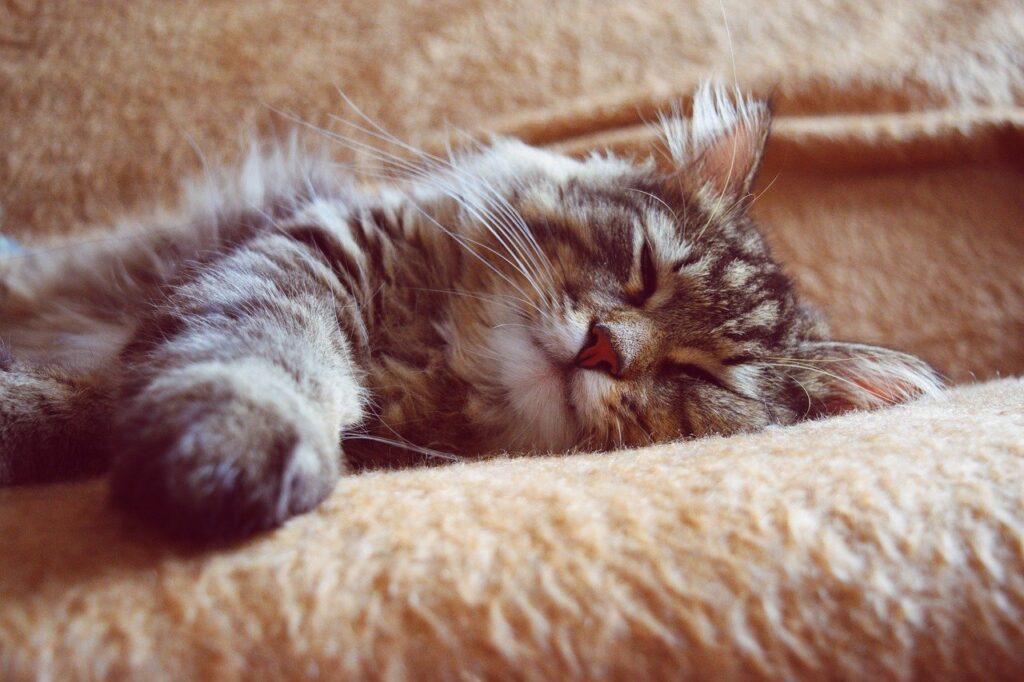The average breathing rate of a kitten is 20 to 30 times per minute. If you observe a greater frequency, then you better pay attention to it. However, if your kitten breathes fast while sleeping, it may or may not be a warning signal.
How to determine breathing rate of a cat?
Now you might be wondering how do I calculate the breathing rate of my cat? Well, the answer is to closely look at the rise and fall of the rib cage and you will be able to count the breaths. If you have trouble with the rib cage method, you can try counting the number of times they inhale and exhale. You can also gently rest your hand on their stomach.
Why Is My Kitten Breathing Fast While Sleeping?
Breathing rates of kittens are naturally higher when they are in a fearful, excited, or angry state. Weather conditions more severely impact kittens as compared to adult cats.
If the weather is too hot, and your kitten is breathing heavily accompanied by panting, it could be a normal situation. It is also common for kittens to have dreams. If it is a very intense dream, it may cause them to breathe really fast while sleeping. If this only happens every now and then, there is no need to worry.
If you believe something is stressing your kitten out, I suggest that you check out this cat calmer. All you have to do is plug it into an outlet, and it relaxes and de-stresses your cat.

When to worry if your kitten is breathing fast?
If your kitten is continually breathing fast while it sleeps, it can be a matter of concern. To check whether or not there is any complication, you should look for other factors as well.
If they are also experiencing some digestive issues, high temperature, or discoloration of the gums, you should immediately seek the help of a vet. Your cat might also be experiencing physical pain. For example, they might have a claw growing into their pad.
What Are The Major Warning Symptoms Along With Rapid Breathing That Show My Kitten Is Ill?
If your kitten is breathing heavily, and showing some other severe signs, it may be a clear indicator that it is very sick. Some of the warning signs and symptoms include:
- Vomiting after small intervals.
- Mobility issues.
- Dehydration
- Severe diarrhea or constipation.
- No desire to eat or drink something.
Some other long-term symptoms are:
- Weight gain or loss.
- Lack of sociability and liveliness.
- No desire to play and eat actively.
- Behavioral changes.
- Litter box issues.
Additionally, it is common for cats to cover their eyes when they sleep. Therefore, you should not worry if your cat does this.
What Are The Immediate Treatments If My Kitten Is Breathing Fast While Sleeping?
Heavy breathing can be a clear symptom of some sort of complication in your kitten. The instant solution is to bring your cat to the vet who will provide it with oxygen. Intravenous administration of drugs and fluids can also relieve the situation.
If your kitten has a minor issue, you may be able to solve it yourself at home. The key is to ensure your kitten lives in a clean, comfortable, and safe environment.
What If My Kitten Is Breathing 30 Times A Minute While Sleeping?
As discussed earlier, the normal breathing rate of a cat is 20 to 30 times a minute. Therefore, it is perfectly normal if your kitten is at the borderline and breathes 30-35 times a minute. You can simply ignore it. However, remember that it should not be greater than 35 times a minute.
Can Stress Causes Fast Breathing In Kittens?
Yes, a stressful environment can cause fast breathing in kittens and impact the breathing rates while sleeping as well. In this case, make sure to provide a stress-free environment for your kitten and set up hiding places for them.
It is important that your kitten has a nice, comfortable spot to sleep where they fell comfortable. I would recommend you buy some blankets or a cat bed to best accommodate your kitten.
The Bottom Line
Fast breathing in sleeping kittens can be a sign of any respiratory or digestive diseases, however, sometimes, it is perfectly normal.

